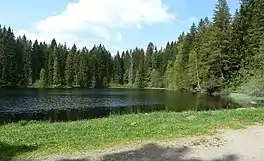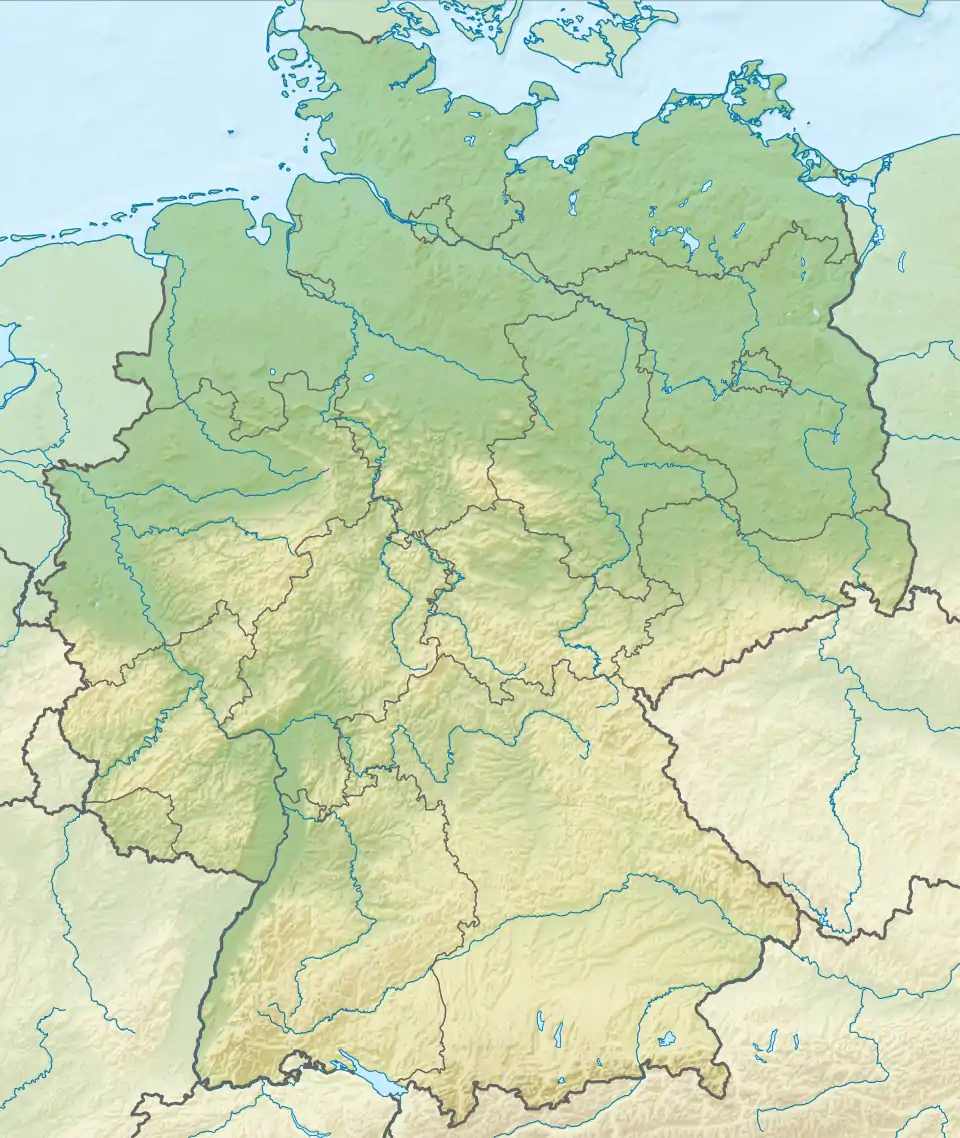| Mathisleweiher | |
|---|---|
 The Mathisleweiher in the Eschengrundmoos Nature Reserve | |
 Mathisleweiher | |
| Location | High Black Forest[1]
|
| Coordinates | 47°53′06″N 8°05′05″E / 47.88489°N 8.08481°E |
| Primary inflows | Zartenbach |
| Primary outflows | Zartenbach → Rotbach → Dreisam → Elz → Rhine → North Sea |
| Max. length | 0.14 km (0.087 mi)[LUBW 1] |
| Max. width | 0.200 km (0.124 mi)[LUBW 1] |
| Surface area | 0.018 km2 (0.0069 sq mi)2[LUBW 2] |
| Surface elevation | 999 m (3,278 ft)[LUBW 3][2] |
The Mathisleweiher is a large bog lake, under 2 hectares in area, in the Black Forest in southern Germany. It lies in the High Black Forest between Feldberg in the west and the Titisee in the east on the territory of Hinterzarten at about 999 m above NN southwest of the village in the Eschengrundmoos Nature Reserve.[3] The pond impounds the Zartenbach which flows through it from west-southwest to east-northeast. The stream rises on the eastern slopes of the Ramselehöhe (1,112 m above NN[LUBW 3]) at about 1,055 m above NN,[LUBW 4] picks up the Eschengrundmoosbach from the right from the protected bog and runs for less than a kilometre before entering the lake. A shorter stream runs from the north from the woods of the Stuckwald. It has a catchment of 1.0 km2[LUBW 5]
The lake is accessible from Hinterzarten but only on foot. A path runs from the village passing close to the lake and a spur branches off to the east shore.
Together with the Mathislehof, Mathislemühle and Mathislewald the pond belongs to the Müller-Fahnenberg Foundation of the University of Freiburg.[4]
Origin of the name
The Mathisleweiher s named after the nearby farm of Mathislehof, which in turn is named after the farmer, Mathias Rombach, who inherited the farm in 1736 by marrying the widow.[5]
References
LUBW
- Official online waterbody map with extract and layers used here: Karte von Mathisleweiher und Umgebung
- General access without presets and layers: Map services of the Baden-Württemberg State Office for the Environment, Survey and Conservation (Landesanstalt für Umwelt, Messungen und Naturschutz Baden-Württemberg)
- 1 2 Length and width measured on the background layer Topographische Karte.
- ↑ Lake area from the layer: Stehende Gewässer.
- 1 2 Height based on black writing on the background layer Topographische Karte.
- ↑ Height based on the contour image on the background layer Topographische Karte.
- ↑ Catchment measured from the background layer Topographische Karte.
Special references
- ↑ Günther Reichelt: Geographische Landesaufnahme: The natural regional units on Sheet 185 Freiburg i. Br. Bundesanstalt für Landeskunde, Bad Godesberg, 1964. → Online-Karte (pdf; 3.7 MB)
- ↑ Digital topographic map 1:10,000 series (DTK 10), Landesamt für Geoinformation und Landentwicklung Baden-Württemberg. URL: http://www.geoportal-bw.de/geoportal/opencms/de/geoviewer.html Archived 2016-05-07 at the Wayback Machine
- ↑ Verordnung des Regierungspräsidiums Freiburg als höhere Naturschutzbehörde über das Naturschutzgebiet »Eschengrundmoos« dated 4 December 1984 (GBl. dated 28 December 1984, p. 705). Online: http://www2.lubw.baden-wuerttemberg.de/public/abt2/dokablage/oac_12/vo/3/3140.htm Archived 2016-03-05 at the Wayback Machine
- ↑ "Müller-Fahnenberg-Stiftung — Universität Freiburg". www.uni-freiburg.de. Archived from the original on 2011-05-23.
- ↑ Klaus Weber: Chronik der Eschbacher Höfe. In: Breisgauer Nachrichten vom 29. Juli 1954. Abschrift unter http://www.stegen-dreisamtal.de/chronesch.htm
External links
- Map of the Mathisleweiher and surrounding area at: Map services of the Baden-Württemberg State Office for the Environment, Survey and Conservation (Landesanstalt für Umwelt, Messungen und Naturschutz Baden-Württemberg)
- Map of the Mathisleweiher and area with footpaths and cycleways at: Geodata viewer of the Baden-Württemberg State Office of Geoinformation and Land Development (Landesamt für Geoinformation und Landentwicklung Baden-Württemberg)